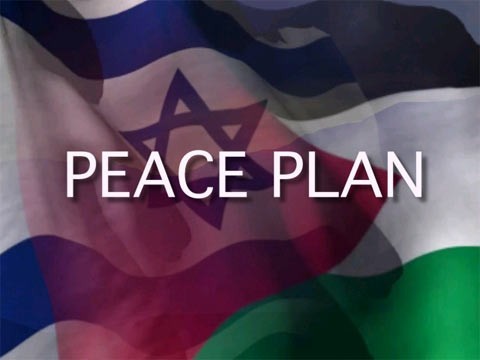ANNAPOLIS, Md. - Israeli and Palestinian leaders opened the U.S.-arranged Mideast peace conference Tuesday by agreeing to immediately resume long-stalled peace talks toward creating an independent Palestinian state by the end of next year, launching the first serious and substantive negotiations in seven years.
In a joint statement read by President Bush, Israeli Prime Minister Ehud Olmert and Palestinian President Mahmoud Abbas pledged:
"We express our determination to bring an end to bloodshed, suffering and decades of conflict between our peoples; to usher in a new era of peace, based on freedom, security, justice, dignity, respect and mutual recognition; to propagate a culture of peace and nonviolence; to confront terrorism and incitement, whether committed by Palestinians or Israelis."
"We agree to immediately launch good-faith bilateral negotiations in order to conclude a peace treaty resolving all outstanding issues, including all core issues without exception, as specified in previous agreements," it continued. "We agree to engage in vigorous, ongoing and continuous negotiations and shall make every effort to conclude an agreement before the end of 2008."
The agreement was reached after weeks of intense negotiations and it was not clear until Bush stepped to the podium in the majestic Memorial Hall at the U.S. Naval Academy in Annapolis, Md., that the two sides would come together on how to move forward on the path toward peace.
The first peace talks are to be held Dec. 12, Bush said, and are to continue biweekly after that.
Bush was followed b Abbas, who made an impassioned appeal to Israelis to support the peace process, saying that war and terrorism "belong to the past."
"Neither we nor you must beg for peace from the other. It is a joint interest for us and you," he said. "Peace and freedom is a right for us, just as peace and security is a right for you and us."
"It is time for the circle of blood, violence and occupation to end. It is time for us to look at the future together with confidence and hope. It is time for this tortured land that has been called the land of love and peace to live up to its name," Abbas said.
Next up, Olmert promised that "the negotiations will address all the issues which thus far have been evaded."
"We will not avoid any subject," he said. "While this will be an extremely difficult process for many of us, it is nevertheless inevitable. I know it. Many of my people know it. We are ready for it."
Speaking directly to the Arabs at the conference, he said: "It is time to end the boycott and alienation toward the state of Israel," referring to Arab nations who do not have relations with Israel.
"We no longer and you no longer have the privilege of clinging to dreams which are disconnected from the suffering of our peoples," he said.
In his talk, Abbas gave no indication that the Palestinians were willing to concede on any of the flashpoint issues that have derailed previous peace efforts: the status of disputed Jerusalem, refugees, the borders of an independent Palestine and Israeli settlements.
"I have the right here to defend openly and with no hesitation the right of my people to see a new dawn, with no occupation, no settlement, no separation wall, no prisons with thousands of prisoners, no assassinations, no siege, and no roadblocks around villages and cities," Abbas said.
After reading aloud the freshly reached agreement, Bush shook hands with Abbas and Olmert. Then those leaders shook each other's hands.
To maximize the moment of potential breakthrough, the three went through the gestures again. This time, they clasped hands together. And, for a moment, Bush stepped back and raised his hands to encourage the other two to come together for a handshake, which they did. It harkened back to a memorable image of his predecessor, Bill Clinton, in one of his own Mideast efforts more than a decade ago.
The Bush administration has been buffeted by skepticism over prospects that the Annapolis Conference can set the stage for the creation of a Palestinian state by the end of Bush's second term in early 2009. Because of this, administration officials from the president on down have sought to minimize expectations for any major breakthrough here. But they also insist that the exercise is not futile.
In his remarks, Bush laid out the reasons he said now is the right time to pursue a Mideast peace settlement - something he and the Israeli and Palestinians leaders said they would like to achieve before the U.S. president leaves office in January 2009.
"First, the time is right because Palestinians and Israelis have leaders who are determined to achieve peace," Bush said. "Second, the time is right because a battle is under way for the future of the Middle East and we must not cede victory to the extremists. Third, the time is right because the world understands the urgency of supporting these negotiations."
For all the high-anxiety surrounding this conference, there were lighter moments as well - the kind of intervals typified by the so-called "class picture" gatherings of world leaders engaged in high summitry.
At one point Tuesday morning, Bush, Olmert and Abbas stepped out of the superintendent's quarters building at the U.S., Naval Academy and waved to media representatives staking out the event nearby. Bush, who was in the middle of the two leaders, exclaimed: "Good morning everybody. Thank you. It's a beautiful day here."
Friday
July 18th, 2025
7:49PM









